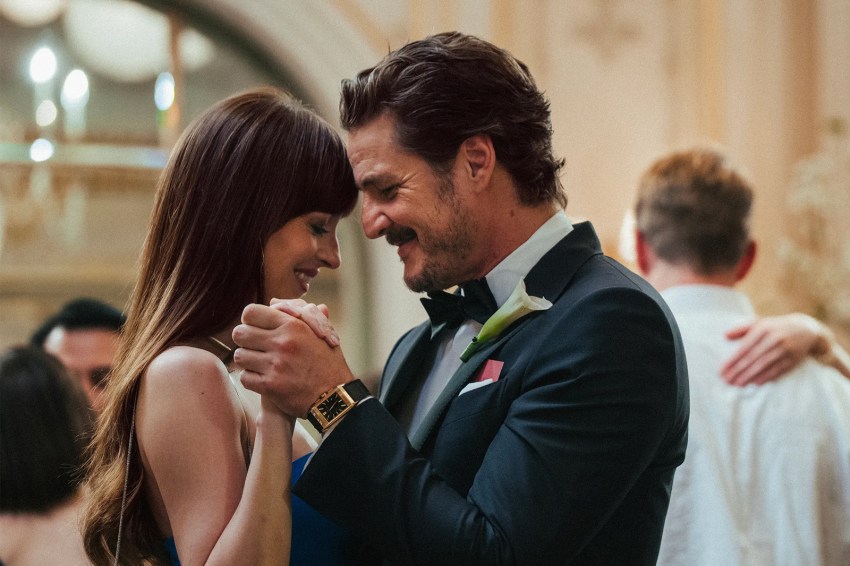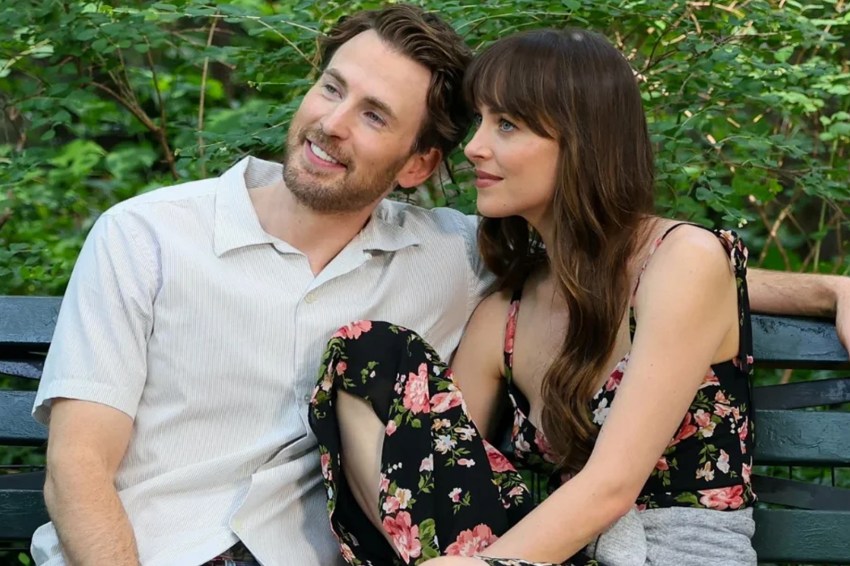On paper, Celine Song’s latest feature-length film from A24, Materialists, looked like a promising modern rom-com with a new take on old archetypes that would tackle the economic realities of 2025: a wealth-gap that is growing steeper by the day, and an education gap where more women are receiving college educations than their male peers.
After watching the trailer, I was convinced Song would employ fun, light-hearted tropes and genre to rectify what these realities mean for outdated gender stereotypes that expect men to earn more in heterosexual relationships.
If you haven’t seen the film yet, I can’t recommend spending money on a ticket unless you’re the type that enjoys mental masochism. Plenty of people will have fallen into the same trap I did, and I’m sure we will be talking about it for weeks to come, like a cinematic Fyre Festival we need collective vindication from.
In hindsight, the masterclass press tour delivered by Dakota Johnson, Pedro Pascal, and Chris Evans was probably overcompensating for the complete lack of personality and flat affect found throughout the film. Haters may echo criticisms of 50 Shades Of Grey that Johnson, like her character Lucy also claims, simply doesn’t know how to act, but Evans and Pascal match her energy, affect, and cadence in a way that feels intentional.
Mirrored in the scene where Evan’s character, John, performs in an experimental theater production with awkward dialogue that Lucy admits to not understanding completely, Song winks at the audience to reinforce the fact that these are stylistic choices. The truth is that this is not a rom-com, but an experimental, artsy film that hints at satire without fully embracing it, and probably won’t land well with anyone who hasn’t gotten an MFA (myself included).
Because everything is so subdued, because there is no authentic emotion expressed or surreal over-the-top commentary like 2022’s The Menu, the film doesn’t work. It has bright moments and rising tension full of potential, but Song never turns the corner, never fully pulls the rug out from under us. The “soft” twist that one of Lucy’s matchmaking clients, Sophie, has been assaulted isn’t a full shock to our systems because there was something “off” about this rom-com from the beginning.

A24
The trance-like harpy spa-music playing behind the unrealistic dialogues. Cigarette smoking as a plot device for conversation. An onslaught of preachy speeches and one liners like when Lucy asks if the company has seen issues with assault before and her boss tells her, “Of course, this is dating”. All these elements combine in a way that prevents us from suspending our disbelief. We’re not supposed to fully relate to or lose ourselves in this world, but remain aware that it’s a representation and critique.
As much as Lucy claims she “didn’t know how to stand or speak” in her past life as an actor, the truth is, that’s exactly what she does in her job as a matchmaker. She is polished, attractive, well-spoken, and knows exactly what to say to obtain and retain a slew of clients. The strategic repetition of phrases like “I promise you will marry the love of your life” and “You don’t have to believe it; I believe it,” call into question their sincerity.
While Lucy’s remorse over what happened to Sophie comes off as genuine—she leaves the wedding she and John crashed to drive an hour into the city when Sophie’s assaulter won’t stop ringing her buzzer —something still feels off. Their exchanges plays more like scripted diatribes on sexual violence than an actual conversation between two people.
It’s this lack of real human connection between any of the characters that had me fully anticipating a hard pivot into psychological thriller or horror territory. Once we learn the truth about Sophie’s date, and how all of his personal attributes were fabricated, I thought Pedro Pascal’s character would turn out to be a serial killer. His true secret, in fact, was going through a limb lengthening surgery to become six feet tall, one of Song’s many nods to arbitrary modern dating standards.
Some scenes, however, have great comedic timing, like a women insisting on finding a Republican partner who goes to church every Sunday, only for Lucy to push back on the tall ask, as her client is a closeted lesbian with three children.

A24
In the end, Lucy and John decide to rekindle their relationship in a businesslike deal sealed with a hand-shake. Beyond a flashback of them fighting over money, we never see how or why they fell in love with each other in the first place, and therefore, are never fully invested in their romance. Song seems to indicate that it doesn’t matter. That humans cannot be distilled down to qualities and then paired in a mathematical formula of compatibility. But we have no resolution to the economic challenges presented either. Life is expensive, and if love is sharing a life with someone, how are we supposed to foot the bill?
We’re not left with any concrete conclusions by the time the credits anti-climatically roll. Lucy says at one point in the film that, “The perception of a big happy family is all you need to have a big happy family.” In A24 and Song’s case, the perception of a classic rom-com is all you need to get people into theaters. I just can’t say at the end of it all, what exactly it was we were brought in to see.
After watching the trailer, I was convinced Song would employ fun, light-hearted tropes and genre to rectify what these realities mean for outdated gender stereotypes that expect men to earn more in heterosexual relationships.
I couldn’t have been more wrong.
If you haven’t seen the film yet, I can’t recommend spending money on a ticket unless you’re the type that enjoys mental masochism. Plenty of people will have fallen into the same trap I did, and I’m sure we will be talking about it for weeks to come, like a cinematic Fyre Festival we need collective vindication from.
In hindsight, the masterclass press tour delivered by Dakota Johnson, Pedro Pascal, and Chris Evans was probably overcompensating for the complete lack of personality and flat affect found throughout the film. Haters may echo criticisms of 50 Shades Of Grey that Johnson, like her character Lucy also claims, simply doesn’t know how to act, but Evans and Pascal match her energy, affect, and cadence in a way that feels intentional.
Mirrored in the scene where Evan’s character, John, performs in an experimental theater production with awkward dialogue that Lucy admits to not understanding completely, Song winks at the audience to reinforce the fact that these are stylistic choices. The truth is that this is not a rom-com, but an experimental, artsy film that hints at satire without fully embracing it, and probably won’t land well with anyone who hasn’t gotten an MFA (myself included).
Because everything is so subdued, because there is no authentic emotion expressed or surreal over-the-top commentary like 2022’s The Menu, the film doesn’t work. It has bright moments and rising tension full of potential, but Song never turns the corner, never fully pulls the rug out from under us. The “soft” twist that one of Lucy’s matchmaking clients, Sophie, has been assaulted isn’t a full shock to our systems because there was something “off” about this rom-com from the beginning.

A24
The trance-like harpy spa-music playing behind the unrealistic dialogues. Cigarette smoking as a plot device for conversation. An onslaught of preachy speeches and one liners like when Lucy asks if the company has seen issues with assault before and her boss tells her, “Of course, this is dating”. All these elements combine in a way that prevents us from suspending our disbelief. We’re not supposed to fully relate to or lose ourselves in this world, but remain aware that it’s a representation and critique.
As much as Lucy claims she “didn’t know how to stand or speak” in her past life as an actor, the truth is, that’s exactly what she does in her job as a matchmaker. She is polished, attractive, well-spoken, and knows exactly what to say to obtain and retain a slew of clients. The strategic repetition of phrases like “I promise you will marry the love of your life” and “You don’t have to believe it; I believe it,” call into question their sincerity.
While Lucy’s remorse over what happened to Sophie comes off as genuine—she leaves the wedding she and John crashed to drive an hour into the city when Sophie’s assaulter won’t stop ringing her buzzer —something still feels off. Their exchanges plays more like scripted diatribes on sexual violence than an actual conversation between two people.
It’s this lack of real human connection between any of the characters that had me fully anticipating a hard pivot into psychological thriller or horror territory. Once we learn the truth about Sophie’s date, and how all of his personal attributes were fabricated, I thought Pedro Pascal’s character would turn out to be a serial killer. His true secret, in fact, was going through a limb lengthening surgery to become six feet tall, one of Song’s many nods to arbitrary modern dating standards.
Some scenes, however, have great comedic timing, like a women insisting on finding a Republican partner who goes to church every Sunday, only for Lucy to push back on the tall ask, as her client is a closeted lesbian with three children.

A24
In the end, Lucy and John decide to rekindle their relationship in a businesslike deal sealed with a hand-shake. Beyond a flashback of them fighting over money, we never see how or why they fell in love with each other in the first place, and therefore, are never fully invested in their romance. Song seems to indicate that it doesn’t matter. That humans cannot be distilled down to qualities and then paired in a mathematical formula of compatibility. But we have no resolution to the economic challenges presented either. Life is expensive, and if love is sharing a life with someone, how are we supposed to foot the bill?
We’re not left with any concrete conclusions by the time the credits anti-climatically roll. Lucy says at one point in the film that, “The perception of a big happy family is all you need to have a big happy family.” In A24 and Song’s case, the perception of a classic rom-com is all you need to get people into theaters. I just can’t say at the end of it all, what exactly it was we were brought in to see.
